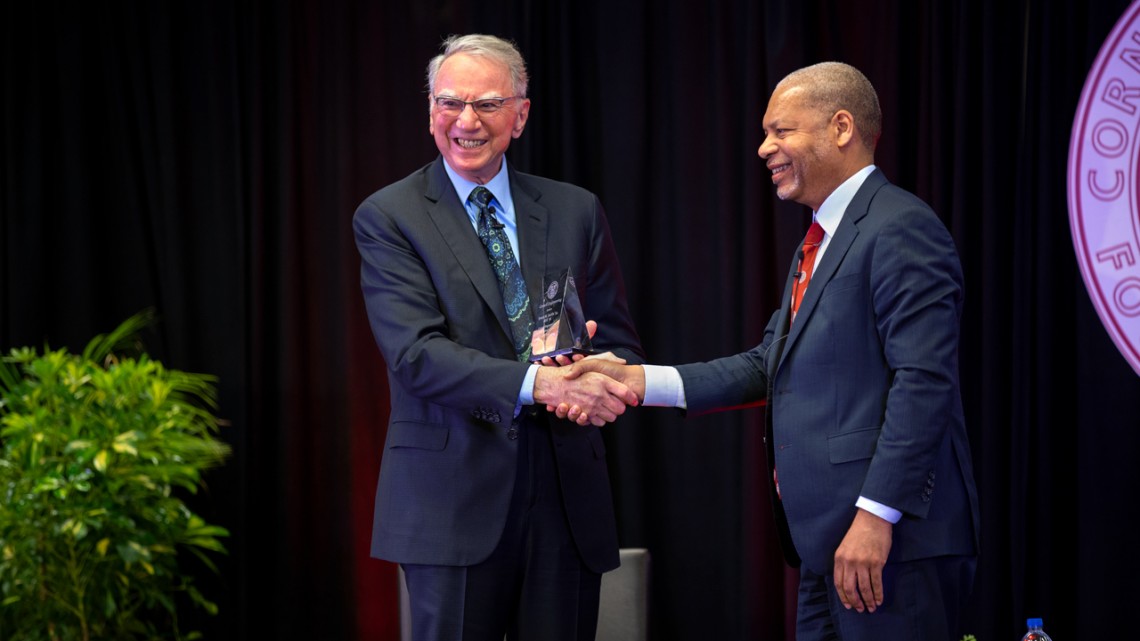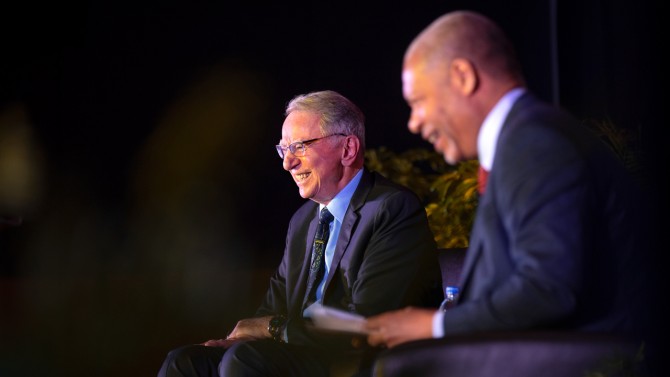
Irwin Jacobs ’54, BEE ’56, left, receives the Cornell Engineering Distinguished Alumni Award from Lance Collins, the Joseph Silbert Dean of Engineering.
Qualcomm founder Jacobs receives engineering alumni award
By Matt Hayes
The high school guidance counselor offered suspect advice to his young charge.
“The first thing he said was, ‘There’s no future in science or engineering,’” said Irwin Jacobs ’54, BEE ’56, recounting advice he received as a young student. “Luckily, that proved to be wrong.”
An avid entrepreneur whose invention of code-division multiple access (CDMA) technology unleashed the power of modern wireless communications, Jacobs has made a career out of defying expectations. On April 22 in Phillips Hall, Jacobs received the Cornell Engineering Distinguished Alumni Award in recognition of his extraordinary leadership, vision and the distinction he has brought to the college.
In a lively discussion with Lance Collins, the Joseph Silbert Dean of Engineering, Jacobs touched on topics of entrepreneurship, risk and the future of wireless communications.
“One always has to be ready for changes that you really didn’t anticipate and didn’t do much planning towards,” Jacobs said.
Born in 1933 in New Bedford, Massachusetts, and educated at Cornell (where he met his future wife, Joan Klein Jacobs ’54, a graduate of the College of Human Ecology) and later at the Massachusetts Institute of Technology where he received his doctoral degree in just three years, Jacobs took his first of many chances professionally when he was recruited to help launch the engineering program at the University of California, San Diego (UCSD), in 1966, just as information theory was taking shape.
His 1965 textbook, Principles of Communication Engineering, proved pivotal. The success of the book led to requests for consulting work from California-based companies and military agencies. For years, Jacobs had drilled into his students’ minds the idea that theory had a place in the real world. Forming the company Linkabit Corp. in 1968, Jacobs saw an opportunity to prove that lesson as Linkabit focused on government contracts for satellite encryption. Business poured in.
He left his academic post in 1972 to dedicate himself full time to the company. He sold Linkabit in 1980 and retained a leadership role until he announced his retirement in 1985, at age 51.
Jacobs’ restless creative energy wouldn’t allow him to sit still for long. Three months later, he co-founded Qualcomm Inc. with, he said, no clear business plan or set idea for what the company would do. Jacobs told his wife that he hoped it would one day grow to around 100 employees – a number the company has exceeded many times over.
The emergence of cellular phones in the 1980s opened tantalizing possibilities for Jacobs and his engineers. By developing CDMA, Qualcomm discovered a way to more efficiently handle signals. CDMA proved superior to rival technologies, and by the time third-generation communication systems rolled out in 1998, it was the standard for wireless communications.
By 2018 the company had more than 35,000 employees, revenues nearing $23 billion and more than 130,000 patents and patent applications worldwide.
With their success, Irwin and Joan Jacobs are signatories of the Giving Pledge and have donated hundreds of millions of dollars to support education, health care, the arts and other causes in San Diego and more broadly. They have provided generous support for scholarships, fellowships and professorships at Cornell, as well as the Jacobs Technion-Cornell Institute at Cornell Tech, and at MIT, the Technion and UCSD.
President Martha E. Pollack said the Jacobses have been relentless in using their wealth to change the world for the better.
“They are truly a Cornell family in every sense of the word: Not only in their connections to Cornell, but also their commitment to supporting the ethos and the mission of this university,” she said.
Collins described Jacobs as thoughtful, innovative and a risk-taker. “There have been few people in my lifetime who have done as much as you, Irwin, to completely transform an industry, with ripple effects to so many others,” Collins said.
Jacobs told the students that there are limitless possibilities ahead, “as long as you’re willing to take advantage of change.”
That concept struck many of the engineering students in attendance.
“You can become comfortable with ideas within the status quo and you think those are the only options to pursue ideas. Thinking outside the box and believing in something else that no one else believes in, it pushes the envelope,” said Abdullah Ridwan ’22, a Jacobs scholar in the College of Engineering.
Deepika Kavety ’19, also a Jacobs scholar, found Jacobs’ unorthodox path inspiring. “Life can go different ways, and it’s important to be open to new opportunities,” she said.
Media Contact
Get Cornell news delivered right to your inbox.
Subscribe

